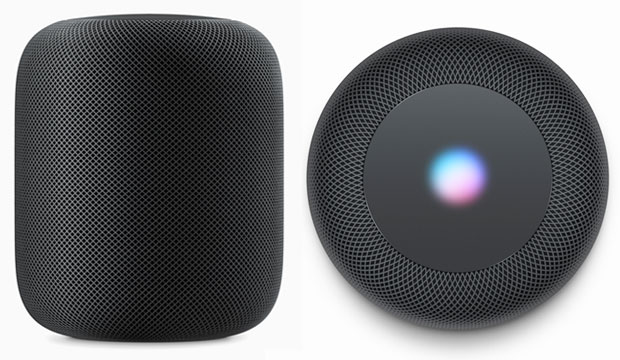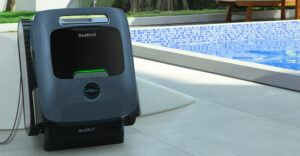Critics have begun weighing in on Apple’s HomePod smart speaker, and they’re loving the device’s sound but don’t have much affection for its smarts.
The HomePod’s sound outclassed top-shelf competitor SonosOne, according to Matthew Panzarino, writing for TechCrunch.
“The HomePod was the ‘best’ sounding. It’s nuanced and subtle with great separation and clarity across all kinds of music,” he wrote.
“The One, for instance, had decent mid range but an overly bright high-end with just the out of the box calibration,” Panzarino continued. “At maximum volume, the One became shrill and painful where the HomePod maintained balance.”
Pumped out through a woofer with custom amplifier and seven tweeters, the audio also impressed Brian X. Chen, who reviewed the HomePod for The New York Times.
“The result is a speaker with a deep bass and rich treble that is loud enough to fill a large room with superb sound,” he wrote. “HomePod makes the Amazon Echo and Google’s Home sound muffled and tinny in comparison.”
‘Embarrassingly Inadequate’
However, Chen was less complimentary about the performance of Apple’s digital assistant, Siri, on the HomePod.
“Siri on HomePod is embarrassingly inadequate, even though that is the primary way you interact with it,” he wrote.
“Siri is sorely lacking in capabilities compared with Amazon’s Alexa and Google’s Assistant,” Chen continued. “Siri doesn’t even work as well on HomePod as it does on the iPhone.”
For example, Siri on the HomePod can’t be trained to recognize different speakers.
“Unlike ‘Hey, Siri’ on your phone, the HomePod responds to everyone,” wrote Megan Wollerton for Cnet.
“That makes it easier for the whole family to use,” she explained, “but hurts its customizability across multiple users, since it can’t recognize a specific voice to allow purchases.”
Speaker Blindness
Not recognizing speakers may not sound like a big deal, but it can be if you’re the kind of person who blindly rushes through setup prompts.
“If you just click yes during all the setup prompts, literally anyone can ask the HomePod to send or read your text messages,” wrote Nilay Patel for The Verge.
“Seriously, it’ll just read your texts to anyone if your phone is anywhere on the same WiFi network, which usually reaches far beyond the same room as the HomePod,” he pointed out.
While Siri can’t distinguish speakers, it is good at recognizing speech, even distorted speech, according to Nicole Nguyen, who reviewed the HomePod for BuzzFeed.
“Siri could hear me while I was wearing my retainers (“Hayy Sheeree, remind me teh bring mah headphonez toomerow”), brushing my teeth, or cooking with the overhead vent turned on,” she wrote.
Failing to Keep Up With the Alexas
Though disappointing, Siri’s so-so performance as a smart speaker digital assistant was expected.
“Siri has not kept pace with Alexa and Google Assistant in capabilities,” Tirias Research Principal Analyst Kevin Krewell told TechNewsWorld.
Apple has never taken Siri seriously, noted Rob Enderle, principal analyst at the Enderle Group, treating it more as a feature than a platform.
“Amazon, Google and even Microsoft take AI far more seriously and are putting millions into their related efforts,” he told TechNewsWorld. “Apple is starting behind, and their lack of focus on this capability suggests they’ll fall farther back and not catch up.”
Despite its shortcomings, Siri has an advantage over its rivals in the smart home context because it supports more languages than they do, said Jonathan Collins, a research director at ABI Research.
“As the smart home voice-control market continues to grow, this will be a key benefit its rivals will have to match,” he told TechNewsWorld.
Apple Music Exclusivity
Another sore point with critics was the lack of support for services outside the Apple ecosystem.
“The HomePod also doesn’t really know that Pandora exists or Tidal or Google Play Music or SiriusXM or TuneIn Radio or SoundCloud or any of a thousand other music services that you might use throughout the course of listening to music in your lifetime,” wrote The Verge’s Patel.
“It’s an incredibly frustrating limitation,” he continued. “Amazon owns Amazon Music, but lets you set Spotify as the default on the Echo. Google runs Google Play Music and YouTube, but lets you set Spotify as the default on the Google Home.”
Apple hasn’t been courting third-party apps as aggressively as Amazon and Google, said Ross Rubin, principal analyst at Reticle Research.
“Today, HomePod is being sold into the base of Apple Music subscribers,” he told TechNewsWorld. “It’s a decent market to sell into — it has 40 million subscribers — but it’s limited compared to Echo’s and Google’s addressable market.”
Dampening Audiophiles’ Interest
It could be a difficult hill to climb if Apple should decide to expand its service offerings in the future.
The HomePod’s initial exclusivity will “make it harder for the product to move out of the Apple loyalist space,” Enderle maintained.
Many of the customers outside of Apple’s base might already have bought Amazon Echos, he reasoned. Getting them to pay a hefty price for a product they could see as redundant would be problematic.
The absence of the HomePod’s seamless support for non-Apple music services will put a damper on interest on the part of serious music listeners, said Charles King, principal analyst at Pund-IT.
“If you’re an Apple fan who mainly wants a Siri-activated solution to stream Apple Music files, you’ll love the HomePod. If you’re looking for a serious Apple-based competitor to Amazon Alexa or Google Home-based devices, you’re likely to be disappointed,” he told TechNewsWorld.
“Then again, Apple has a long history of initially aiming new products at its dedicated customers, then adding in other features and functions over time,” King added.
Sell It and Developers Will Come
While Apple doesn’t have the volume of third-party relationships that some of its competitors have, it does have a significant base of HomeKit certified smart home device providers that will support smart home control through the HomePod, ABI’s Collins noted.
“There is every reason to believe that the pull of the Apple user base — especially given the close integration of the HomePod with iPhones — will be enough to attract a wide range of third-party support over time,” he maintained.
However, even the HomeKit experience on the HomePod could use some improvement, wrote The Verge’s Patel.
“Siri as a smart home controller on the HomePod works fine if you have compatible devices and have done the work of setting up HomeKit, but nothing about HomeKit is particularly simple or fun to use,” he observed. “But that’s basically the state of every smart home system, so I don’t think Apple’s too far behind there.”























































